It’s getting so close to the end of the school year I can taste summer (of course, it might be all the great fresh fruits and vegetables we have been eating). Strange as it may seem, finishing a school year means starting to plan for the next year. This is partly because if I don’t commit ideas to print, then I’ll probably forget them over the summer.
One thing I want to try next year with both my creative writing club and any writing RTI classes I teach is playing games. I was lucky. I grew up in a home with an English teacher mother and a Librarian father. Words were a source of interest, amusement, and pleasure. I strongly believe that along with being a reader, good writers engage in word play. So I got thinking about how I could help develop that sense of play in those who maybe didn’t have a chance to grow this wordplay skill at home. I thought of Taboo, a game I played with my family. It always got a bit loud and crazy (usual for my family), but it also made me think outside my usual vocabulary rut. Scrabble was another game I played a lot since it was one of my grandmother’s favorite games. I have to admit, I like a little faster paced game, but it did stretch my vocabulary (and when I played with my siblings, who tried to add made-up words, it occasionally became a contact sport.) There is, BTW, a ton of different versions of Scrabble. The Chocolate edition is of special interest to me.
I did a bit of research to find several games I could use next year–and following is the by no means complete list of games for writers and word play. Descriptions come from Amazon or BoardGameGeek.com
A to Z – Fundex’s A to Z game certainly runs the gamut of high-pressure alphabet fun. Each team is supplied with a plastic tray containing indentations for each letter of the alphabet, as well as a supply of transparent chips. Dice are rolled to select a timer setting (15 or 30 seconds) and a category from among 336 possibilities, such as Superheroes or Card Games. Set the timer and start covering letters on your board as you announce responses appropriate to the category–cover the A and B with chips by saying “Aquaman” and “Batman,” for example. Fill your tray and win the game, but watch out: some rounds allow opposing teams to remove chips from your board.
Apples to Apples – The name of the game is a play on the phrase “apples to oranges,” 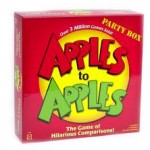 and the game is about making comparisons between different things. General game play is as follows: players are dealt red cards which have a noun printed on them, and the judge (a different player in each turn) draws a green card on which an adjective is printed and places it for all players to see. Each player then chooses a red card they are holding that they think best describes the green card. The judge then decides which adjective she likes best.
and the game is about making comparisons between different things. General game play is as follows: players are dealt red cards which have a noun printed on them, and the judge (a different player in each turn) draws a green card on which an adjective is printed and places it for all players to see. Each player then chooses a red card they are holding that they think best describes the green card. The judge then decides which adjective she likes best.
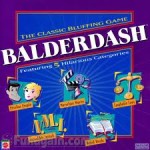 Balderdash – Balderdash rewards knowledge and creativity. Players are given a word and they each write down what they think the definition is. The definition guesses are then read aloud and voted on. A player gets points if their definition is correct but you can also earn points if people vote for your proposed definition. Includes game board, 336 game cards, answer sheet pad, 6 movers, 1 die and 1 instruction sheet. For 2 or more players.
Balderdash – Balderdash rewards knowledge and creativity. Players are given a word and they each write down what they think the definition is. The definition guesses are then read aloud and voted on. A player gets points if their definition is correct but you can also earn points if people vote for your proposed definition. Includes game board, 336 game cards, answer sheet pad, 6 movers, 1 die and 1 instruction sheet. For 2 or more players.
Blurt – Think fast! What word means “a partially dried grape”? Be the first to say “raisin,” 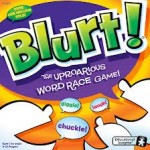 and you’re on your way to winning this riotous game of rapid word recall. Players take turns reading clues aloud, competing to blurt out the correct answer first and move ahead on the board. The first person or team to circle the board wins. Sounds simple, right? But as the race for the right word heats up, and the blurting gets boisterous, it’s easy to get tongue-tied! Blurt is a great vocabulary builder for kids, a hilarious addition to adult parties, and a must for family game night. Includes junior version for ages 7 to 9. For 3 to 12 players.
and you’re on your way to winning this riotous game of rapid word recall. Players take turns reading clues aloud, competing to blurt out the correct answer first and move ahead on the board. The first person or team to circle the board wins. Sounds simple, right? But as the race for the right word heats up, and the blurting gets boisterous, it’s easy to get tongue-tied! Blurt is a great vocabulary builder for kids, a hilarious addition to adult parties, and a must for family game night. Includes junior version for ages 7 to 9. For 3 to 12 players.
 Boggle – Shake the letter dice, flip the 3-minute sand timer and put together as many words as you can. Boggle, a Parker Brothers classic, is as fun as it is great for improving spelling skills. For 2 or more players, ages 8 to adult.
Boggle – Shake the letter dice, flip the 3-minute sand timer and put together as many words as you can. Boggle, a Parker Brothers classic, is as fun as it is great for improving spelling skills. For 2 or more players, ages 8 to adult.
Buy Word – BuyWord is a game of words with a twist. You pay good hard cash to buy your letters, then form a word to sell at a profit, if you can. Your payoff depends on the quantity and the quality of the letters in your word. BuyWord mixes basic mathematics, money management, and good old-fashioned word-building in a simple, yet elegant blend that keeps every player involved in every turn until the very end.
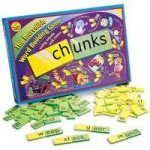 Chunks – (Not terribly fond of the name- makes me think of “blowing chunks”) Great hands-on reading and spelling tools for developing fluency! The possibilities are endless with 70 yellow onsets (consonants blends and digraphs) and 70 green rimes (rhyming sounds) that students will love mixing and matching! Grades 1-4.
Chunks – (Not terribly fond of the name- makes me think of “blowing chunks”) Great hands-on reading and spelling tools for developing fluency! The possibilities are endless with 70 yellow onsets (consonants blends and digraphs) and 70 green rimes (rhyming sounds) that students will love mixing and matching! Grades 1-4.
Cyrano – (this one sound fun to me.) Tell me how great my poem is! In Cyrano, you take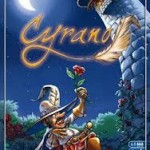 the role of a star-crossed lover who must write beautiful poems to earn the right to climb the tower and join his One True Love. Each round, a theme and two rhymes are selected. Players simultaneously compose a 4-line poem using the selected theme and rhymes. Examples are given for players lacking inspiration, but if you use them, you won’t earn as many points. Once all players are done, they take turns reciting poems, followed by a secret vote where everyone votes for their favourite poem. Everyone who votes for the winner scores points. The first player to reach their One True Love wins the game! Features Easy to play; no knowledge of poetry needed! A party game for the whole family.
the role of a star-crossed lover who must write beautiful poems to earn the right to climb the tower and join his One True Love. Each round, a theme and two rhymes are selected. Players simultaneously compose a 4-line poem using the selected theme and rhymes. Examples are given for players lacking inspiration, but if you use them, you won’t earn as many points. Once all players are done, they take turns reciting poems, followed by a secret vote where everyone votes for their favourite poem. Everyone who votes for the winner scores points. The first player to reach their One True Love wins the game! Features Easy to play; no knowledge of poetry needed! A party game for the whole family.
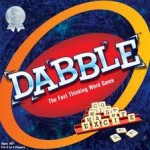 Dabble – Dabble is a great learning tool for kids and fun for the entire family. At the core of the game lies a fast-paced word game that will help children and adults develop many useful skills – inclduing vocabulary, spelling, and quick thinking.
Dabble – Dabble is a great learning tool for kids and fun for the entire family. At the core of the game lies a fast-paced word game that will help children and adults develop many useful skills – inclduing vocabulary, spelling, and quick thinking.
 will have you pushing your luck and on the edge of your seat. Take turns adding letters to a teetering tower of words. Go for longer words – upward, downward or sideways – to score more points. Age 10+, number of players 2 to 4.
will have you pushing your luck and on the edge of your seat. Take turns adding letters to a teetering tower of words. Go for longer words – upward, downward or sideways – to score more points. Age 10+, number of players 2 to 4. Pass the Bomb – A fast-paced game to test your word knowledge, Pass the Bomb is the explosive word game that will blow your mind! Players draw a card bearing two or more letters. The other players then have to say a word that contains the letters on the card as they pass around a bomb. Quickly say a word and pass the bomb before it blows up. The player who is holding the bomb when it blows, collects the card. After 13 cards have been used, the player with the fewest cards wins!
Pass the Bomb – A fast-paced game to test your word knowledge, Pass the Bomb is the explosive word game that will blow your mind! Players draw a card bearing two or more letters. The other players then have to say a word that contains the letters on the card as they pass around a bomb. Quickly say a word and pass the bomb before it blows up. The player who is holding the bomb when it blows, collects the card. After 13 cards have been used, the player with the fewest cards wins!
QuickWord – Players participate in every round to come up with word lists according to letters, clues, and categories. Four color categories provide lots of exciting challenges. Race against the timer and outsmart the other players. Each time you win a round, check off a colored box on the score pad. First player to complete all color categories wins the game. Complete instructions included. Ages 12 and up. 2 or more players.
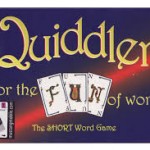 Quiddler – Quiddler is a fast paced game of words. Arrange your hand into words by taking turns drawing and discarding. Use your high point letters but don’t get caught with them uncombined. High score wins. Short words can help you win too because a bonus is given for the most words as well as one for the longest word.
Quiddler – Quiddler is a fast paced game of words. Arrange your hand into words by taking turns drawing and discarding. Use your high point letters but don’t get caught with them uncombined. High score wins. Short words can help you win too because a bonus is given for the most words as well as one for the longest word.
Scattergories – Scattergories is the crowd-pleasing, fast-thinking game from Parker Brothers. Roll the die and you have just seconds to come up with a band name, vegetable, shoe style and more, all beginning with the right letter. But be creative! If another player matches your answer, you get 0 points. With more than 190 categories and 20 letters the combinations and fun are endless.
Brothers. Roll the die and you have just seconds to come up with a band name, vegetable, shoe style and more, all beginning with the right letter. But be creative! If another player matches your answer, you get 0 points. With more than 190 categories and 20 letters the combinations and fun are endless.
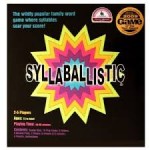 Syllaballistic – This game is played in 3 or 5 minute rounds. Players quickly write down a list of ten words that contain the corresponding word fragment like “tion” or “ous.” The fragment can be found anywhere within the word. Within a time limit, players write down a word for each of the ten fragments. Players score points if no other player has the same answers, and it based on the number of syllables in your word. You earn one point per syllable. Score the most points to win the game.
Syllaballistic – This game is played in 3 or 5 minute rounds. Players quickly write down a list of ten words that contain the corresponding word fragment like “tion” or “ous.” The fragment can be found anywhere within the word. Within a time limit, players write down a word for each of the ten fragments. Players score points if no other player has the same answers, and it based on the number of syllables in your word. You earn one point per syllable. Score the most points to win the game.
Synonyms– An exciting word challenge that entertains and educates in a fast-paced and fun board game. Players race their pawns around the board to be the first to collect all the letters of the word SYNONYMS. How to play: Roll the die and select a card. You have one minute to earn your letter by naming the designated number of synonyms – unless another player declares a challenge. Play as a team or individually and put your verbal skills to the test! Improve your active vocabulary with every game. 2-8 Players
fun board game. Players race their pawns around the board to be the first to collect all the letters of the word SYNONYMS. How to play: Roll the die and select a card. You have one minute to earn your letter by naming the designated number of synonyms – unless another player declares a challenge. Play as a team or individually and put your verbal skills to the test! Improve your active vocabulary with every game. 2-8 Players
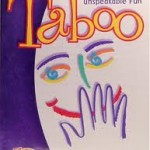 Taboo – (one of my favorites) Players take turns describing a word or phrase on a drawn card to their partner without using five common additional words or phrases also on the card. The opposing partners watch a timer and use a buzzer to stop the game, buzz the player describing if one of the five off limits words or phrases is used, or the describing player makes any gestures. The describing team gets a point for each card they guess successfully and the opposing team gets a point for each card they pass on, make gestures on, or lose for saying one of the off limits words or phrases.
Taboo – (one of my favorites) Players take turns describing a word or phrase on a drawn card to their partner without using five common additional words or phrases also on the card. The opposing partners watch a timer and use a buzzer to stop the game, buzz the player describing if one of the five off limits words or phrases is used, or the describing player makes any gestures. The describing team gets a point for each card they guess successfully and the opposing team gets a point for each card they pass on, make gestures on, or lose for saying one of the off limits words or phrases.
Typo – Individual letter cards are placed on the table and players take turns adding letter cards from their hands to build words. Those who can’t place their letters have to take the longest letter row into their hand. The first to play all their cards wins. Contains a set of letter cards, timer and instructions. Ages 8 and up.
cards from their hands to build words. Those who can’t place their letters have to take the longest letter row into their hand. The first to play all their cards wins. Contains a set of letter cards, timer and instructions. Ages 8 and up.
 Upwords – A 3-dimensional word game that’s a stack of fun. Now the expanded 10 X 10 grid offers more squares to build words across, down and up. And with 36 more tiles, you can still stack lots of letters on letters to form new words and score sky high. For 2 to 4 players.
Upwords – A 3-dimensional word game that’s a stack of fun. Now the expanded 10 X 10 grid offers more squares to build words across, down and up. And with 36 more tiles, you can still stack lots of letters on letters to form new words and score sky high. For 2 to 4 players.
Word on the Street – On each turn, one team flips over a category card. Team members frantically brainstorm words that fit the category while the opposition tries to sidetrack them. The team must agree on a word and pull each letter of that word one lane closer to their side of the street, all before the time runs out.
frantically brainstorm words that fit the category while the opposition tries to sidetrack them. The team must agree on a word and pull each letter of that word one lane closer to their side of the street, all before the time runs out.
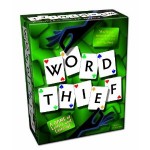 Word Thief – A multi-award winning and internationally acclaimed game where players use letter cards to make words and score points. A strong vocabulary doesn’t win the game: competitors can snatch away other players’ letters and words, adding an extra element of plotting, planning, and fun.
Word Thief – A multi-award winning and internationally acclaimed game where players use letter cards to make words and score points. A strong vocabulary doesn’t win the game: competitors can snatch away other players’ letters and words, adding an extra element of plotting, planning, and fun.
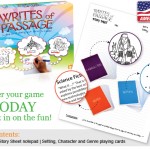
Writes of Passage – a unique and enjoyable game that brings six to eight players together to craft six to eight stories. Each player contributes to each story in this game of cooperation, which unleashes creativity by randomly combining improbable genres, settings and characters.
 You’ve been Sentenced – Grades 3 & up. This sentence-building game uses unique five-sided cards with multiple conjugations of a base word. With a hand of 10 cards, players try to score the most points per round by constructing the longest, grammatically correct, and sensible sentence. Any player can object to another players sentence, on either grammatical grounds, or the fact that the sentence just doesn¿t make sense. The defending player and the objecting player get to argue their points to the rest of the players, who form a jury. Half the fun is trying to defend, explain, and justify a completely ridiculous sentence to the other players. First player to reach 200 points wins.
You’ve been Sentenced – Grades 3 & up. This sentence-building game uses unique five-sided cards with multiple conjugations of a base word. With a hand of 10 cards, players try to score the most points per round by constructing the longest, grammatically correct, and sensible sentence. Any player can object to another players sentence, on either grammatical grounds, or the fact that the sentence just doesn¿t make sense. The defending player and the objecting player get to argue their points to the rest of the players, who form a jury. Half the fun is trying to defend, explain, and justify a completely ridiculous sentence to the other players. First player to reach 200 points wins.
Know any more great word games for writers and word play? Let us know in the comments.
Now go play!

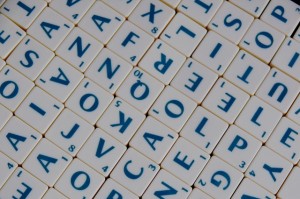
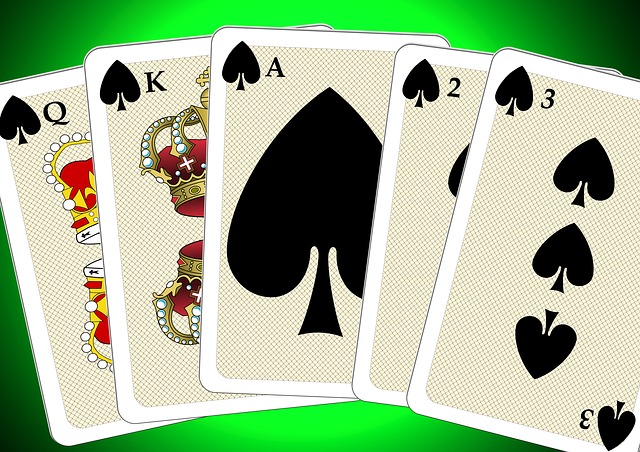
Here’s a game that can work with almost all ages: Exquisite Corpse. (It’s also called Consequences.) One person starts writing (you can determine whether this is to be a story or a poem) and has a given (brief) amount of time. When that individual’s time is up, he or she folds the paper so that only the final line is visible and passes it on to the next person, who adds to the story, based on what was on the paper when he or she received it, for the same limited amount of time, then folds it and passes it on, etc. If you have a group with limited attention spans, you can get several stories going. If you are doing poetry, it tends to work best if each person writes two lines, folds the paper so only the last line is visible and then passes it along. As the saying goes, “Hilarity ensues.”
I also recommend Beyond Balderdash. In addition to defining words, one may have to come up with what an acronym stands for, what happened on a particular date, who some individual was or a tiny movie synopsis. It taps into different parts of the imagination while still being, at heart, a language game. I would have to say that it is both Anneliese’s and my favorite board game.
Thanks Carol, I’ll have to try the Exquisite Corpse (? Where did that title come from?) with my writing students. They can only look at the last line, correct? Beyond Balderdash sounds worth checking out as well.
Yep, last line only,
As I understand it, “Consequences” was the old name of a game in which one person told part of a story aloud (I think I remember the Alcott sisters playing it in “Little Women,” actually) and then others broke in to continue it. The variation “Exquisite Corpse” was originally an surrealist artists’ “game” — two or three artists would each draw a segment of a body on folded paper. I googled and found this example of what a family on vacation does with the fame; I thought it might amuse you: http://mslk.com/reactions/exquisite-corpse-aka-the-drawing-game/
That looks like way too much fun. Think we’ll have to try it this summer. Love the sentence, draw, interpret sentence one. Could be hysterical.